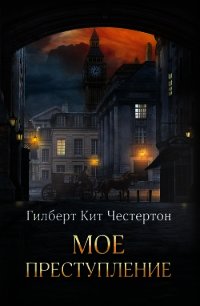Английский с улыбкой. Охотничьи рассказы / Tales of the Long Bow - Честертон Гилберт Кийт (книги бесплатно без txt) 📗
She had come suddenly round the corner of the house. Her dress was of a dark but fresh blue colour, of a very simple form, but not too artistic. And in the morning light she looked less like a schoolgirl and more like a serious woman of twenty-five or thirty; a little older and a great deal more interesting. And something in this morning seriousness increased the reaction of the night before. One single wave of relief went through Crane to think that at least his terrible green hat was gone and finished with for ever. He had worn it for a week without caring one bit for anybody’s opinion; but during that ten minutes’ trivial conversation under the lamp-post, he felt as if he had suddenly grown donkey’s ears in the street.
Because of the sunny weather he prepared a little table for three in a sort of veranda open to the garden. When the three sat down to it, he looked across at the lady and said:
“I fear I’m going to look like an eccentric; one of those eccentrics your cousin disapproves of, Miss Smith. I hope it won’t spoil this little lunch for anybody, but I am going to have a vegetarian meal.”
“Are you?” she said. “I would never have said you looked like a vegetarian.”
“Just lately I have only looked like a fool,” he said calmly; “but I think I’d sooner look a fool than a vegetarian in the ordinary way. This is rather a special occasion. Perhaps my friend Hood had better begin; it’s really his story more than mine.”
“My name is Robert Owen Hood,” said that gentleman, rather sarcastically.
“That’s how improbable memories often begin; but the only point now is that my old friend here insulted me horribly by calling me Robin Hood.”
“I would have called it a compliment,” answered Audrey Smith. “Buy why did he call you Robin Hood?”
“Because I used the long bow [8],” said the lawyer.
“But to do you justice,” said the Colonel, “it seems that you hit the bull’s eye. [9]”
While he spoke
Archer came in with a dish which he placed before his master. He had already served the others with the earlier meals, but he carried this one with the pomp of one bringing the boar’s head at Christmas [10]. It consisted of a plain boiled cabbage.
“I was challenged to do something,” continued Hood, “which my friend here declared to be impossible. In fact, any sane man would have declared it to be impossible. But I did it all the same. Only my friend, in the heat of rejecting and mocking the idea, used an expression he didn’t think about. I might almost say he made a rash vow [11].”
“My exact words were,” said Colonel Crane solemnly, “‘If you can do that, I’ll eat my hat.’”
He leaned forward thoughtfully and began to eat it. Then he continued in the same meditative way:
“You see, all rash vows are literal or nothing. There might be a debate about the logical and literary way in which my friend Hood fulfilled HIS rash vow. But I accepted it as a challenge in the same pedantic sort of way. It wasn’t possible to eat any hat that I wore. But it could be possible to wear a hat that I could eat. Parts of dress could hardly be used for diet; but parts of diet could really be used for dress. It seemed to me that it could become my hat, if I wore it systematically as a hat and had no other, putting up with all the disadvantages. Making a fool of myself was the fair price to be paid for the vow or bet; because you should always lose something on a bet.”
And he rose from the table with a gesture of apology.
The girl stood up. “I think it’s perfectly splendid,” she said. “It’s as wild as one of those stories about looking for the Holy Grail. [12]”
The lawyer also had risen, rather quickly, and stood touching his long chin with his thumb and looking at his old friend under bent brows in a rather meditative manner.
“Well, you’ve made me a witness all right,” he said, “and now, with the permission of the court, I’ll leave the witness-box. I’m afraid I must be going. I’ve got important business at home. Good-bye, Miss Smith.”
The girl answered a little mechanically; and Crane seemed to recover from a similar trance, when he stepped after the retreating figure of his friend.
“I say, Owen,” he said quickly, “I’m sorry you’re leaving so early. Do you really have to go?”
“Yes,” replied Owen Hood gravely. “My private affairs are quite real and practical, I assure you.” His grave mouth showed some signs of a smile at the corners when he added:“The truth is, I don’t think I mentioned it, but I’m thinking of getting married.”
“Married!” repeated the Colonel, as if struck by a lightning.
“Thanks for your compliments and congratulations, old fellow,” said the satiric Mr. Hood. “Yes, it’s all been thought through. I’ve even decided who I am going to marry. She knows about it herself. She has been warned.”
“I am really sorry,” said the Colonel in great distress, “of course I congratulate you from my heart; and her even more so. Of course I’m very happy to hear it. The truth is, I was surprised… not so much in that way…”
“Not so much in what way?” asked Hood. “I suppose you mean some would say I was on the way to be an old bachelor. But I’ve discovered it isn’t half so much a question of years as of habits. Men like me get elderly more by choice than chance; and there’s much more choice and less chance in life than your modern fatalists believe. For such people fatalism changes even chronology. They’re not unmarried because they’re old. They’re old because they’re unmarried.”
“Indeed you are mistaken,” said Crane earnestly. “As I say, I was surprised, but my surprise was not as rude as you think. It wasn’t that I thought there was anything wrong about… somehow it was rather the other way… as if things could fit better than one thought… as if – but anyhow, as little as I know about it, I really do congratulate you.”
“I’ll tell you all about it before long,” replied his friend. “It’s enough to say just now that it was all connected with my succeeding after all in doing – what I did. She was the inspiration, you know. I have done what is called an impossible thing; but believe me, she is really the impossible part of it.”
“Well, I must not keep you from such an impossible engagement,” said Crane smiling. “Really, I’m awfully glad to hear about all this. Well, good-bye for now.”
Colonel Crane stood watching the square shoulders and dark red hair of his old friend, when they disappeared down the road, in a rather indescribable state of mind. When he turned quickly back towards his garden and his other guest, he noticed something had changed. Things seemed different in some light-headed and illogical manner. He could not himself understand what had happened; indeed, he did not know whether it happened inside or outside. He was very far from being a fool; but his brains were of the sort that are directed outwards to things, the brains of the soldier or the scientific man, and he had no practice in analysing his own mind. He did not quite understand why the news about Owen Hood should give him that strange sense of a difference in things in general. Without a doubt, he was very fond of Owen Hood; but he had been fond of other people who had got married without especially disturbing the atmosphere of his own back-garden. He even thought that his feelings on their own might have worked the other way; that they might have made him worry about Hood, and wonder whether Hood was making a fool of himself, or even feel suspicious or jealous of Mrs. Hood – something else made him feel quite the other way. He could not quite understand it; there seemed to be an increasing number of things that he could not understand. This world in which he himself wore pieces of green cabbage and in which his old friend the lawyer got married suddenly like a man going mad – this world was a new world, at once fresh and frightening, in which he could hardly understand the figures that were walking about, even his own. The flowers in the flower-beds looked differently, at once bright and nameless; and even the line of vegetables beyond could not altogether depress him with the memories of his last escapade. Indeed he felt very much like someone in the morning of the world; but beyond that he could understand nothing.



